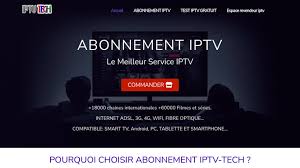In the rapidly evolving world of digital media, Internet Protocol Television (iptv abonnement) has emerged as a game-changer. Offering a more flexible, customizable, and efficient way to consume television content, IPTV leverages the power of the internet to deliver a vast array of channels and on-demand content directly to users’ screens. This article delves into the mechanics, benefits, challenges, and future prospects of IPTV services.
What is IPTV?
IPTV stands for Internet Protocol Television, a system where television services are delivered using the Internet Protocol Suite over a packet-switched network like the internet, instead of being delivered through traditional terrestrial, satellite, and cable television formats. IPTV can be streamed live, or as on-demand video, providing users with the ability to watch their favorite shows and movies anytime and anywhere.
How IPTV Works
IPTV operates by converting television content into small packets of data, which are transmitted over the internet. Here’s a simplified breakdown of how it works:
- Content Acquisition: IPTV providers acquire content from various sources, including television networks, production companies, and online streaming services.
- Encoding and Compression: The acquired content is then encoded and compressed to ensure efficient delivery over the internet. This process involves converting the video and audio signals into a digital format.
- Streaming: The encoded content is delivered to users through servers via a broadband connection. Users can access the content using an IPTV set-top box, smart TV, computer, or mobile device.
- Playback: The user’s device decodes the digital signals back into audio and video, allowing the content to be displayed on their screen.
Types of IPTV Services
IPTV services can be broadly classified into three types:
- Live Television: This is similar to traditional broadcast television but delivered over the internet. It allows users to watch live TV programs as they are broadcasted.
- Video on Demand (VOD): This service allows users to select and watch video content from a library of available titles. Examples include movies, TV shows, and documentaries.
- Time-Shifted TV: This feature lets users watch previously broadcasted shows at a later time. It includes catch-up TV, which allows users to watch missed episodes, and start-over TV, which lets users restart live shows from the beginning.
Benefits of IPTV
IPTV offers numerous advantages over traditional television services:
- Flexibility and Convenience: Users can watch content anytime, anywhere, on any device with an internet connection. This flexibility is a significant improvement over traditional TV schedules.
- Vast Content Library: IPTV services often provide access to an extensive library of on-demand content, including movies, TV shows, documentaries, and exclusive programming.
- Interactive Features: IPTV services offer interactive features like pause, rewind, fast-forward, and record, enhancing the viewing experience.
- Personalization: Users can create personalized playlists, receive recommendations based on viewing habits, and enjoy a more tailored viewing experience.
- Cost-Effectiveness: IPTV can be more cost-effective than traditional cable or satellite TV, offering various subscription plans and often eliminating the need for expensive hardware.
Challenges and Considerations
Despite its many benefits, IPTV also faces several challenges:
- Bandwidth Requirements: High-quality IPTV streaming requires a robust and stable internet connection. Insufficient bandwidth can lead to buffering and poor video quality.
- Regulatory Issues: IPTV services must navigate complex regulatory landscapes, including content licensing, copyright laws, and broadcasting rights.
- Service Reliability: The quality of IPTV service can be affected by network congestion, server outages, and other technical issues.
- Piracy Concerns: Unauthorized IPTV services and piracy remain significant concerns, impacting content creators and legitimate service providers.
The Future of IPTV
The future of IPTV looks promising, driven by advancements in technology and changing consumer preferences. Key trends include:
- Integration with Smart Devices: As smart homes become more prevalent, IPTV services will likely integrate seamlessly with various smart devices, providing a more connected and intuitive viewing experience.
- Enhanced User Experience: Future IPTV services will focus on enhancing user experience through artificial intelligence, machine learning, and advanced analytics to provide more personalized content and recommendations.
- Expansion of Content Offerings: The range of content available through IPTV is expected to expand further, with more exclusive shows, movies, and interactive content.
- 5G Technology: The rollout of 5G networks will significantly boost IPTV service quality by providing faster and more reliable internet connections, enabling smoother streaming and higher-resolution content.
Conclusion
IPTV represents a significant shift in the way we consume television content, offering a more flexible, customizable, and interactive experience compared to traditional TV services. While it faces challenges such as bandwidth requirements and regulatory hurdles, the future of IPTV looks bright, with technological advancements promising to enhance and expand its capabilities. As the world continues to embrace digital transformation, IPTV is poised to become the preferred method of television consumption for millions of viewers worldwide.

